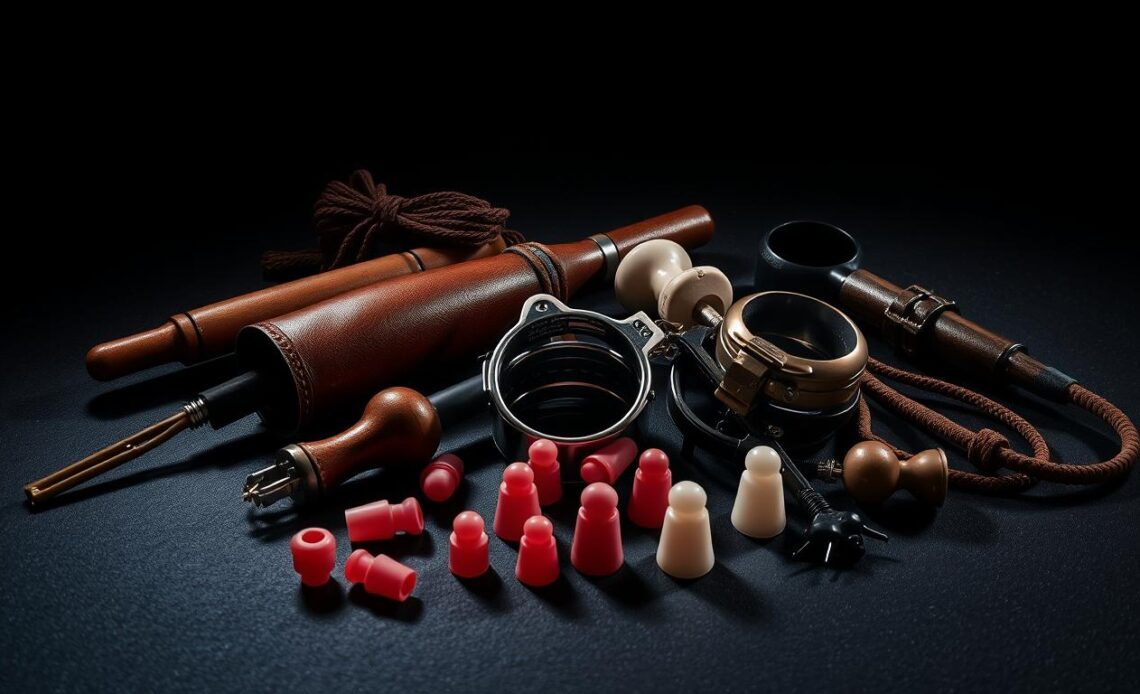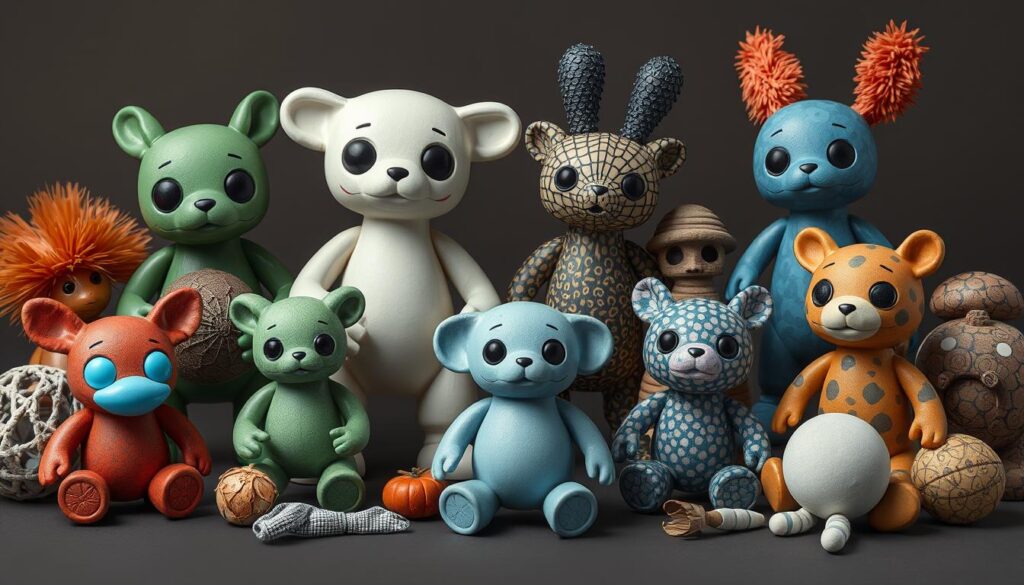
Exploring BDSM play can be a thrilling experience, especially when incorporating toys that enhance power dynamics and sensory experiences. To ensure a fulfilling and safe experience, understanding the diverse types of toys and implementing necessary precautions is crucial.
As we delve into the world of BDSM, we’ll explore the essential aspects of safely using toys during play, providing guidance for both beginners and experienced practitioners. Prioritizing safety and proper usage can significantly enhance your sex life and overall experience.
Key Takeaways
- Understand the different types of BDSM toys and their safe usage.
- Learn how to select body-safe materials for your toys.
- Discover proper cleaning techniques to maintain hygiene.
- Improve your communication practices during BDSM play.
- Enhance your overall experience by prioritizing safety and pleasure.
Understanding BDSM Toy Safety
BDSM toy safety is a multifaceted concept that encompasses various aspects, from material selection to usage practices. Ensuring the safety of BDSM toys is crucial for a fulfilling and enjoyable experience. Exploring BDSM toy safety helps practitioners make informed decisions about their play activities.
Why Safety Matters in BDSM Play
Safety in BDSM play is paramount because it directly impacts both the physical and emotional well-being of all participants. By prioritizing safety, individuals can engage in activities with confidence, knowing that they are minimizing the risk of harm. Effective communication and negotiation before play are essential in establishing clear boundaries and a mutual understanding of desires.
Implementing aftercare practices post-play is also vital for emotional well-being and closure after intense or challenging scenes. As noted by experienced practitioners, “Safety is not just about avoiding harm; it’s about creating a foundation of trust that allows for deeper exploration and connection.” This quote highlights the importance of safety in enhancing the overall BDSM experience.
| Aspect of Safety | Importance in BDSM Play |
|---|---|
| Material Selection | Prevents allergic reactions and infections |
| Proper Usage | Reduces the risk of physical harm |
| Aftercare Practices | Enhances emotional well-being and closure |
The Risks of Unsafe Practices
Unsafe practices in BDSM play can lead to a range of negative consequences, from minor discomfort to serious injuries or emotional distress. Understanding these risks is crucial for practitioners to make informed decisions about their activities. Recognizing that different toys carry different risk profiles is essential for responsible BDSM play.
For instance, using toys made from non-body-safe materials can cause allergic reactions or infections. Similarly, improper use of restraint tools can lead to circulation problems or nerve damage. By being aware of these risks, individuals can take steps to mitigate them, such as choosing high-quality, body-safe toys and learning proper usage techniques.
Different Types of BDSM Toys and Their Purposes
In the realm of BDSM, a variety of toys are used to create unique experiences. The diverse world of BDSM toys caters to different desires and preferences within the community. Understanding the different types of BDSM toys and their purposes is essential for a fulfilling experience.
Impact Toys: Floggers, Paddles, and Crops
Impact toys like floggers, paddles, and crops are designed to deliver various sensations, from gentle taps to more intense stimulation. These toys are favored for their ability to provide physical stimulation, enhancing the play experience. Each type of impact toy has its own safety considerations, making knowledge about their use crucial.
Restraint Tools: Cuffs, Rope, and Spreader Bars
Restraint tools such as cuffs, rope, and spreader bars are used to limit movement and create vulnerability, establishing dominance and submission dynamics. It’s essential to have specific knowledge about circulation, pressure points, and quick-release mechanisms when using these restraints. This knowledge ensures safe and enjoyable play.
Sensory Play Items: Blindfolds, Feathers, and Wax
Sensory play items, including blindfolds, feathers, and wax, engage different senses by either enhancing or restricting them. These items create unique experiences that require careful attention to safety. By understanding the purpose and proper use of these toys, practitioners can select the right tools for their desired experience, exploring different types of BDSM play.
Choosing Body-Safe Materials for BDSM Toys

To ensure a safe and pleasurable BDSM experience, it’s vital to select toys made from body-safe materials. Body-safe sex toys are functionally nonporous, meaning their surfaces are hard, impenetrable, and/or hydrophobic, making them sanitizable.
Safe Materials: Silicone, Stainless Steel, and Leather
Safe materials for BDSM toys include silicone, particularly platinum-cured silicone, which is non-porous, hypoallergenic, and available in various firmness levels. Stainless steel, such as 316 stainless steel, is another safe option, offering durability and unique sensations. However, it’s crucial to verify the quality of stainless steel products to avoid harmful metals or coatings. Leather, when properly treated and maintained, can be safe for external use, but it requires special care to prevent bacterial growth.
Understanding the properties of these materials is key to making informed decisions about which toys to purchase and how to properly care for them.
Materials to Avoid and Why
Certain materials should be avoided when it comes to BDSM toys. Jelly, PVC, and other porous materials can harbor bacteria and potentially leach harmful chemicals, posing health risks. It’s essential to steer clear of these materials to ensure both short and long-term health and safety.
By choosing body-safe materials, individuals can significantly reduce health risks associated with BDSM play. While body-safe materials may cost more initially, they offer greater longevity and safety, making them a worthwhile investment.
Essential Communication Practices for BDSM Play
The key to a fulfilling BDSM experience lies in the ability of partners to communicate their desires, limits, and boundaries effectively. Clear communication and consent are foundational principles in BDSM play, ensuring that all parties feel safe, respected, and in control of their experiences.

Establishing Boundaries Before Play
Before engaging in BDSM activities, it’s crucial to establish clear boundaries. This involves detailed discussions about desires, limits, and expectations, creating a framework for consensual exploration. By doing so, partners can foster trust, safety, and a deeper understanding of each other’s needs and comfort levels.
Using Safe Words and Signals Effectively
Safe words play a vital role in establishing boundaries and signaling when play needs to stop. Different systems, such as the traffic light system, can be used for safe words, and non-verbal signals can be implemented for situations where verbal communication isn’t possible. This provides a crucial safety mechanism, allowing immediate communication of discomfort or the need to stop without breaking the scene’s dynamic.
Checking In During Play
Regular check-ins during play help monitor comfort levels and ensure ongoing consent, especially during intense or extended sessions. This practice is essential for maintaining a safe and enjoyable experience for all partners involved.
Proper Cleaning and Maintenance of BDSM Toys
Proper care for your BDSM toys not only extends their lifespan but also ensures they remain safe to use. Maintaining cleanliness and performing regular checks are crucial steps in toy maintenance.
Cleaning Different Materials
Different materials require specific cleaning methods. For instance, silicone toys can be washed with soap and water, making them relatively easy to clean. The soap binds to microbes, and when rinsed with water, it washes away germs. For other materials like metal, a similar soap and water approach works well. However, for materials like leather, a dry cleaning method or a specific leather cleaner is recommended to prevent damage.
Storage Best Practices
After cleaning, storing your toys properly is essential to prevent damage and contamination. It’s recommended to store your gear in a cool, dry place away from direct sunlight. This helps in preserving the quality of the materials. For example, silicone toys should not be exposed to high temperatures or direct sunlight for extended periods as it can cause degradation.
When to Replace Worn or Damaged Toys
Regularly inspecting your toys for signs of wear and damage is crucial. If a toy is damaged, it’s essential to replace it to avoid any potential harm during play. For instance, if a silicone toy shows signs of cracking or if a metal toy has rust, it’s time to replace it. Establishing a routine for checking your toys ensures they remain safe for use.
- Use soap and water for cleaning non-porous materials like silicone and metal.
- Store toys in a cool, dry place away from direct sunlight.
- Regularly inspect toys for signs of wear and damage.
Safe Use Guidelines for Impact Toys
BDSM enthusiasts often favor impact toys for the unique sensations they provide, but safety should always be the top priority. Impact toys like whips, canes, and crops are designed to deliver varying degrees of physical stimulation. To ensure a safe and enjoyable experience, it’s crucial to understand how to use these toys correctly.
Safe Impact Zones on the Body
When using impact toys, it’s essential to target safe areas of the body. Fleshy areas such as the buttocks, thighs, and upper back are generally considered safe for impact play. Avoid areas with vital organs, bones, or joints to prevent serious injury. For more information on safe practices, exploring resources on BDSM and toy safety can be beneficial.
Starting Light and Building Intensity
Begin with light, gentle strikes to warm up the area and gauge your partner’s tolerance. Gradually increase the intensity based on their feedback and comfort level. This approach helps establish boundaries and ensures a positive experience for both partners.
Recognizing Signs of Distress
It’s vital to recognize signs of distress during impact play, which can include physical indicators such as tensing up or emotional cues like becoming unresponsive. Regular check-ins with your partner can help identify any issues early on.
| Safe Areas | Areas to Avoid |
|---|---|
| Buttocks | Vital organs |
| Thighs | Bones |
| Upper back | Joints |
Safety Precautions for Restraints and Bondage
To ensure a safe and enjoyable experience, it’s crucial to understand the safety precautions for restraints and bondage. When using restraints, it’s essential to balance between secure and safe.
Proper Fit and Circulation Checks
Restraints should fit snugly but not too tightly. There should be enough room to slide a finger between the restraint and the skin. Regular circulation checks are vital to prevent circulation problems and discomfort. Look for signs such as color changes, temperature differences, tingling, or numbness.
Quick-Release Mechanisms
Quick-release mechanisms are non-negotiable safety features for restraints. Ensure that all restraints have a quick-release feature or keep safety scissors nearby. This allows for swift action in emergency situations, preventing potential harm.
Time Limitations for Restraint
Limiting the duration of restraint is crucial to prevent anxiety or distress. Prolonged immobility can lead to various physical issues, so it’s essential to approach restraint with caution and monitor the time spent in restraints.
| Safety Measure | Description | Importance Level |
|---|---|---|
| Proper Fit | Ensuring restraints are not too tight or too loose | High |
| Circulation Checks | Regular checks for signs of circulation issues | High |
| Quick-Release Mechanisms | Having a quick-release feature or safety scissors nearby | Critical |
| Time Limitations | Limiting the duration of restraint to prevent physical issues | High |

Health Considerations in BDSM Toy Play
Health considerations play a significant role in ensuring safe and enjoyable BDSM toy play. When using sex toys, it’s essential to be aware of potential health risks and take steps to mitigate them.
Allergies and Sensitivities to Materials
Some individuals may be allergic or sensitive to certain materials used in sex toys. Common allergens include latex, certain metals, and dyes. Choosing body-safe materials like silicone, stainless steel, or glass can minimize the risk of an adverse reaction. If you experience any irritation, discomfort, or other symptoms after using a toy, discontinue use and consult a healthcare professional if symptoms persist.
Preventing Infections and Cross-Contamination
Preventing infections and cross-contamination is crucial when using sex toys. Proper cleaning with soap and water is usually sufficient for body-safe toys. However, sanitizing may be necessary if you’re recovering from an infection or switching between different types of play (e.g., from anal to vaginal use). Using appropriate lubricants and avoiding sharing toys without proper cleaning can also reduce infection risks.
| Toy Material | Cleaning Method | Sanitizing Required |
|---|---|---|
| Silicone | Soap and water | No, unless switching play types |
| Stainless Steel | Soap and water | No, unless recovering from infection |
| Glass | Soap and water | No, unless recovering from infection |
When to Seek Medical Attention
It’s essential to know when to seek medical attention during or after BDSM play. Symptoms like persistent pain, bleeding, or signs of infection (such as redness, swelling, or discharge) warrant a visit to a healthcare provider. Additionally, if you experience any unusual or concerning symptoms after using a sex toy, don’t hesitate to seek professional advice.
Aftercare Essentials Following BDSM Play
BDSM play doesn’t end when the activities stop; aftercare is a vital component that ensures a healthy recovery for all involved. Aftercare involves caring for your partner immediately following a BDSM session, addressing both physical and emotional needs.
Physical Aftercare Techniques
Physical aftercare is crucial for recovery after intense BDSM play. Techniques include applying ice to sore areas, offering water for hydration, and providing warmth with a blanket. These actions help in regulating body temperature and addressing any physical discomfort.
- Hydration: Offering water to replenish lost fluids.
- Temperature Regulation: Using blankets or ice packs as needed.
- Rest: Allowing time for recovery and relaxation.
Emotional Support After Intense Play
Emotional support is equally important, as BDSM experiences can trigger a range of emotions. Partners should check in with each other, offering reassurance and a listening ear. This support helps in processing the experience and reinforces the bond between partners.
- Reassurance: Verbal affirmations of care and appreciation.
- Listening: Providing a safe space to discuss feelings and reactions.
- Connection: Engaging in gentle, affectionate contact.
Creating a Personalized Aftercare Plan
Every individual has unique needs when it comes to aftercare. Creating a personalized aftercare plan involves understanding these needs and adapting to them over time. It’s essential for both partners to communicate their preferences and boundaries.
- Communication: Discussing needs and preferences.
- Flexibility: Being open to adjusting the plan as needed.
- Consistency: Regularly practicing aftercare to strengthen the bond.
Conclusion: Prioritizing Safety for an Enhanced BDSM Experience
By focusing on safety, individuals can unlock a more enjoyable and consensual BDSM experience. Prioritizing safety in BDSM play is essential for creating a respectful and enjoyable experience for all participants. This involves establishing clear communication, implementing safety precautions, and investing in ongoing education about toys and play. By doing so, we enhance trust, intimacy, and enjoyment, making BDSM a powerful tool for connection and pleasure. Ultimately, prioritizing safety respects all participants, creating intense, pleasurable, and sustainable experiences.
FAQ
What materials are best for BDSM toys to ensure they are body-safe?
We recommend using toys made from silicone, stainless steel, and high-quality leather. These materials are durable, easy to clean, and less likely to cause allergic reactions or injuries.
How do I properly clean my BDSM toys?
We suggest cleaning your toys with mild soap and warm water. For more thorough cleaning, you can use a toy cleaner specifically designed for sex toys. Always dry your toys thoroughly after cleaning to prevent bacterial growth.
How should I store my BDSM toys to maintain their quality?
We advise storing your toys in a cool, dry place, away from direct sunlight. This helps prevent damage to the materials and extends the lifespan of your toys.
What are some essential communication practices for safe BDSM play?
We believe that establishing clear boundaries, using safe words, and checking in with your partner during play are crucial for a safe and enjoyable experience.
How often should I inspect my BDSM toys for signs of wear and tear?
We recommend regularly inspecting your toys for any signs of damage, such as cracks, frays, or rust. If you notice any damage, it’s best to replace the toy to prevent accidents during play.
What are some health considerations I should be aware of when engaging in BDSM play?
We suggest being mindful of allergies and sensitivities to certain materials, as well as taking steps to prevent infections and cross-contamination. If you experience any discomfort or pain during or after play, seek medical attention if necessary.

